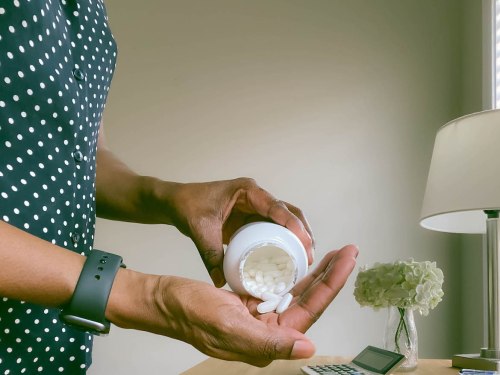Many people take vitamins as part of their diet. In fact, according to a 2022 survey conducted by the Council of Responsible Nutrition, a full 75 percent of Americans take dietary supplements. Unfortunately, for some people, taking supplements can come with one very unwanted side effect: gastrointestinal discomfort. While it’s one of the most common side effects of vitamins or supplements, an upset stomach isn’t something anyone should suffer—and luckily, there are proven methods to stop—and prevent—stomach pain from vitamins.
Experts in This Article
gastroenterologist at NYU Langone Health
gastroenterologist, nutrition and lifestyle medicine specialist, and founder of Sarah Robbins MD
What causes stomach pain or upset from vitamins?
According to Sarah Robbins, MD, MsC, FRCPC, gastroenterologist and physician nutrition specialist, stomach pain or upset is a common side effect of taking vitamins, and there are a few reasons why this might happen.
For one, the problem could be the specific type of supplement. Certain supplements, including vitamin C and iron, can cause gastrointestinal discomfort in some people. “Different nutrients will be digested and absorbed differently in the GI tract, and they can have an effect on the stomach and the small bowel,” Dr. Robbins says, adding that these effects can include nausea, vomiting, diarrhea, and a burning sensation in your stomach.
The contents of your stomach when the supplement is taken can also have an impact. If a supplement is taken on an empty stomach but should be ingested with food, for example, it could result in tummy trouble. The same issue might also occur if a vitamin is taken along with other supplements.
A high dosage of a supplement—or multiple supplements—can also lead to stomach pain. “When we take vitamins or minerals at higher doses, it is often quite stimulating to the gut, which can cause pain,” says Dr. Robbins. “Your gut is moving and squeezing and trying to absorb these nutrients, and it has to work harder, producing pain and cramping and discomfort.”
How to stop stomach pain or upset from vitamins
If you have stomach pain or upset from vitamins, talking to your doctor is always a good idea. But for some general guidelines on how to stop stomach pain from vitamins, Dr. Robbins has a few helpful suggestions for putting an end to supplement-related discomfort.
1. Put something in your stomach.
“Sometimes, it’s helpful if you do have a little bit of food if you haven’t eaten,” says Dr. Robbins. “If you have food or fluid, you dilute the concentration of the supplement, which can alleviate some symptoms.” She suggests eating bland carbohydrates, like toast, crackers, or rice, or drinking water. However, she underscores the importance of not having too much of either. “It’s important not to have a large volume or you’ll stretch and distend the stomach even more,” she says. “The key is to take small amounts of fluid and food to try and mitigate some of the concentration of the supplement without overwhelming the system.”
2. Avoid lying down.
It’s only natural for many of us to want to lie down when our stomachs hurt, but Dr. Robbins cautions against it. “If you have something in your stomach that tends to reflux back up, it will be worse when you’re lying down because you don’t have gravity working in your favor, so I don’t generally recommend lying down if you feel unwell after you’ve had a medication or supplement,” she says. “It’s probably better to stay upright.” She adds that if possible, taking a gentle walk can help stimulate the gut and get things moving slowly but surely.
3. Have a cup of warm tea.
If you’re feeling nauseated after taking a supplement, Dr. Robbins says that you can opt to take an anti-nausea pill. However, she warns that many anti-nausea pills have a sedative effect. As an alternative, consider a warm cup of gut-healthy tea. She recommends peppermint or ginger tea to help alleviate nausea. Just be sure to drink your tea warm and not too hot. “Extremes of hot or cold will stimulate the gut more and you’ll get more cramping,” she says. “Things that tend to be lukewarm or just a little cool are probably more comfortable [for your gut] than either extreme.”
Five tips for preventing stomach pain or upset from vitamins
If you’re not only looking to stop stomach pain or upset from vitamins, but also prevent it, consider these five helpful tips from gastroenterologist Roshini Rajapaksa, MD to help you manage your supplement-induced stomach woes.
1. Find out which vitamins are causing digestive distress.
If you’re taking more than one supplement, first figure out which one—or ones—is the main offender. Dr. Rajapaksa says there are some supplements that are known to cause gastrointestinal discomfort, and one people often complain about is vitamin C. “The reason why vitamin C can [cause this] is because it is highly acidic, which can irritate the stomach lining,” she says.
If foods that are acidic—like lemon, grapefruit, and tomato sauce—don’t always agree with your stomach, there is a chance that a vitamin C supplement could be behind your discomfort. If this is the case, you might want to consider swapping it out for low-acid vitamin C-rich foods, like leafy greens, sweet potatoes, broccoli, brussels sprouts, and papaya.
Dr. Rajapaksa says there are other supplements that can cause an upset stomach, as well. “Fish oil, calcium, and iron are three others that can cause stomach distress or nausea,” she says. If any of these supplements are part of your routine, you may want to take some extra precautions. For example, you probably won’t want to ingest them prior to a workout, which might make them harder to digest. You may also want to consider buying them in a powder form, which is typically gentler on the stomach than a capsule with a hard casing.
2. Space out your intake of supplements.
If you’re taking multiple supplements, you may need to space out your intake so you aren’t ingesting them all at the same time. While swallowing all your supplements in one go may be your preferred method, your stomach might not agree. “It is often worse to combine supplements than to space them out,” says Dr. Rajapaksa, adding that this is especially true if you’re taking any of the supplements she mentioned above—namely, vitamin C, fish oil, calcium, and iron. All to say: When in doubt, space them out.
3. Pair your supplements with food.
“Most supplements will cause less stomach upset if they’re paired with food or eaten right after a meal,” says Dr. Rajapaska. If you previously took your vitamins on an empty stomach and didn’t feel great afterward, it’s definitely worth it to try having them with food. If you don’t know which of your supplements are meant to be taken with food, it shouldn’t be hard to figure it out. Dr. Rajapaska says the label should provide you with the information—and if it doesn’t, you can always ask your doctor.
4. Make sure you aren’t overdoing it.
While most of the time the focus on nutrients surrounds not getting enough, taking too many vitamins can lead to side effects like stomach pain or upset, and, sometimes, more serious health issues. The National Institute of Health is a great resource for information about different vitamins and nutrients, including which foods contain each of them, and what to keep in mind if you’re using a supplement. The site’s fact sheets also include the daily requirements by age and genders, signs of getting too much of a nutrient or not enough, and medications certain supplements may interact negatively with.
5. Purchase supplements from a trusted supplier.
It’s worth mentioning that supplement companies are not regulated by the U.S. Food and Drug Administration. A report published in the Journal of the American Medical Association states that nearly 800 supplement products contain active ingredients not listed on the label, which goes to show just how important it is to trust the company that you’re purchasing supplements from. Look for supplements with labels indicating they have been tested by a third party such as the non-profit Pharmacopoeial (USP) Convention Dietary Supplement Verification Program or ConsumerLab. You’ll also want to check the ingredients list so you’re aware of any fillers or other ingredients that may not agree with you. For example, some gummy vitamins contain artificial sweeteners which some may find hard to digest.
The main takeaway
In a perfect world, everyone would get all the nutrients they need from food and there would be no need to knock back anything in capsule form to meet the recommended daily values. Of course, for a variety of reasons, that isn’t always the case.
For one, it’s not necessarily easy to ensure every meal is perfectly well-rounded. There are occasions when options and time are limited. If you follow a specific way of eating, like a vegan, vegetarian, or dairy-free diet, that can create additional obstacles. Secondly, we’re all coming from different life stages that require their own nutritional needs, too. Seasonality, your genetic makeup, physical activity, medical history, and so much more can play a role in our unique nutrient requirements.
All to say, vitamin supplements can help ensure your body is getting all the nutrients it needs. Of course, supplements shouldn’t cause gastrointestinal discomfort. If you’re experiencing digestive distress as a side effect of taking vitamins, troubleshooting with the above advice of Dr. Rajapaksa and Dr. Robbins might help you stop or prevent stomach pain and upset from vitamins. If not, just ask your MD for help. They can offer advice and may also recommend a registered dietitian who can provide you with tips on getting your nutrients through food so you can rely on supplements less. That is, after all, a far more delicious way to get your vitamins.
Frequently asked questions
Which vitamins are most likely to upset the stomach?
There are certain vitamins that are more likely to upset the stomach, including—but not limited to—vitamin C, iron, calcium, and fish oil, says Dr. Rajapaska. Dr. Robbins adds that magnesium can also cause stomach upset for some people. She notes that it pulls water into the bowel, which can cause diarrhea and stomach cramping, so like most of the aforementioned vitamins, you might want to take it with food, or divide it into smaller doses.
Which vitamins shouldn’t be taken on an empty stomach?
Typically, you’ll want to avoid taking fat-soluble vitamins on an empty stomach, says Dr. Robbins. “In order to both minimize side effects and to maximize the potential for the reason that you’re taking [supplements], you want to take it with some fat,” she says. Vitamins A, D, and K, as well as Coenzyme Q10, or CoQ10 as it is often called, are some examples of fat-soluble vitamins. Dr. Rajapaska also mentions reading the label to determine whether a vitamin supplement should be taken with food.
Which vitamins shouldn’t be taken together?
“In general, if you combine minerals, they tend to interact with each other and cause more stomach upset,” says Dr. Robbins. (Consider iron and zinc, as one example.) She mentions that vitamins can also interfere with prescription medications. “They’ll often reduce absorption of your medication,” she says. With this in mind, she advises that it’s important to take prescription medications separately from your supplements, or to speak directly with your pharmacist to make sure that your prescription doesn’t interact with other supplements you’re taking.
Watch the video below to hear a registered dietitian’s thoughts on supplements:
Sign Up for Our Daily Newsletter
Get all the latest in wellness, trends, food, fitness, beauty, and more delivered right to your inbox.
Got it, you've been added to our email list.











